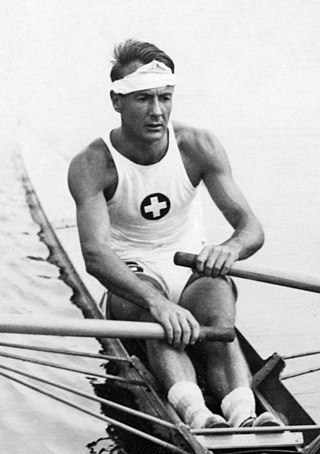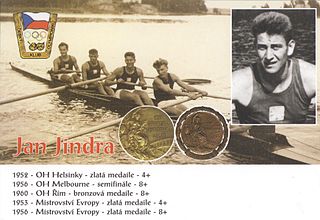
The 1920 Summer Olympics, officially known as the Games of the VII Olympiad and commonly known as Antwerp 1920, were an international multi-sport event held in 1920 in Antwerp, Belgium.
These are the results of the men's double sculls competition in rowing at the 2004 Summer Olympics. In a sculling boat, each rower has two oars, one on each side of the boat. The Rowing events were held at the Schinias Olympic Rowing and Canoeing Centre.

New Zealand competed at the 1996 Summer Olympics in Atlanta, United States. The New Zealand Olympic Committee was represented by 97 athletes and 60 officials. Former Olympic swimmer Dave Gerrard was the team's chef de mission.

Paul Vincent Costello was an American triple Olympic gold medal winner in rowing. He was the first rower to win a gold medal in the same event, double sculls, at three consecutive Olympics. He also won numerous national titles in both the single and double scull in the 1920s.

Rowing at the 1920 Summer Olympics, the first Olympics after World War I, saw five events. The competitions were held from 27 to 29 August in Antwerp, Belgium.

Italy competed at the 1920 Summer Olympics in Antwerp, Belgium. 174 competitors, 173 men and 1 woman, took part in 79 events in 18 sports.

New Zealand competed at the 1920 Summer Olympics in Antwerp, Belgium. It was the first time that the nation had competed independently at the Olympic Games. At the 1908 and 1912 Summer Olympics, New Zealand had competed with Australia in a combined team called Australasia.

The men's single sculls event was part of the rowing programme at the 1920 Summer Olympics. The competition, the fifth appearance of the event, was held from 27 to 29 August 1920. Ten rowers, each from a different nation, competed. The event was won by John B. Kelly Sr. of the United States, the nation's second victory in the event. It was the first of Kelly's three Olympic gold medals; he would also win in the double sculls about an hour later as well as in the 1924 double sculls. In the final, Kelly defeated Great Britain's Jack Beresford in "of the greatest sculling races ever contested." Beresford led most of the way, with Kelly passing him late and winning by one second—a very close race in single sculls. The final held particular significance to Kelly, who had only decided to participate in the Olympics after being excluded from the 1920 Diamond Challenge Sculls; Kelly had wanted "to get a crack at the man who wins the diamond sculls"—which had turned out to be Beresford.

The men's coxed pair event was part of the rowing programme at the 1920 Summer Olympics. The competition was held on 28 and 29 August 1920. It was the second appearance of the event, which had previously been held only at the inaugural rowing competitions in 1900. Four boats, each from a different nation, competed. The event was won by the Italian boat in that nation's debut in the event, with Ercole Olgeni and Giovanni Scatturin the rowers and Guido De Felip the coxswain. France's crew took silver, the second consecutive silver for France. Switzerland earned bronze.

The men's coxed four event was part of the rowing programme at the 1920 Summer Olympics. The competition was held on 28 and 29 August 1920. It was the third appearance of the event, which had previously been held inaugural rowing competitions in 1900 as well as in 1912. Eight boats, each from a different nation, competed. The medals all went to nations that had not won a medal in the men's coxed four previously: Switzerland and the United States took gold and silver, respectively, in their debuts in the event; Norway took bronze.

The men's single sculls event was part of the rowing programme at the 1924 Summer Olympics. The competition, the sixth appearance of the event, was held from 14 to 17 July 1924 on the river Seine. There were 8 competitors from 8 nations, with each nation limited to a single boat. The event was won by Jack Beresford of Great Britain, the nation's third victory in the event. Beresford, who had lost a tightly contested final in 1920 to John B. Kelly Sr., became the first man to win multiple medals in the single sculls though it required him having to compete in the repechage to even secure a place in the final. Great Britain's podium streak in the event extended to four Games; the nation had won a medal each of the five times it appeared, missing only 1904.
The men's double sculls event was part of the rowing programme at the 1924 Summer Olympics. The competition, the third appearance of the event, was held from 15 to 17 July 1924 on the river Seine.

The men's coxed pair event was part of the rowing programme at the 1924 Summer Olympics. The competition, the third appearance of the event, was held from 14 to 17 July 1924 on the river Seine. Five teams, each from a different nation, competed, for a total of 15 rowers and coxswains. The event was won by Switzerland, with rowers Édouard Candeveau and Alfred Felber and coxswain Émile Lachapelle. The two Swiss rowers had earned bronze in 1920 with a different cox. Defending champion Italian rowers Ercole Olgeni and Giovanni Scatturin took silver, this time with Gino Sopracordevole as their cox. Candeveau, Felber, Olgeni, and Scatturin were the first four men with multiple medals in the event. The United States' debut in the event netted a bronze medal for rowers Leon Butler and Harold Wilson and cox Edward Jennings.

The men's coxed four event was part of the rowing programme at the 1924 Summer Olympics. The competition, the fourth appearance of the event, was held from 13 to 17 July 1924 on the river Seine. There were 10 boats from 10 nations, with each nation limited to a single boat in the event. The event was won by Switzerland, the nation's second consecutive victory in the event; the two Swiss victories matched Germany for most among nations to that point. France earned its first medal in the event since 1900 with silver. The United States reached the podium for the second straight Games with a bronze medal. Hans Walter, a member of the Swiss crew in 1920 as well as this year, was the first man to win two medals in the event, and the only one to win two golds.

The men's single sculls competition at the 1932 Summer Olympics in Los Angeles took place at the Long Beach Marine Stadium from 9 to 13 August. There were 5 competitors from 5 nations, with each nation limited to one boat in the event. The event was won by defending champion Bobby Pearce of Australia, the first man to successfully defend an Olympic title in the event and second to win multiple medals overall. Silver went to William Miller of the United States; it was the third consecutive Games in which an American was the runner-up. The United States' podium streak in the event extended to four Games; the nation had won a medal in each of the five times it had appeared. Guillermo Douglas gave Uruguay a bronze medal in its debut in the event. Dick Southwood of Great Britain took fourth place, snapping that nation's five-Games medal streak and marking the first time Great Britain had competed and not won a medal. The only rower not to advance to the final was Canadian Joseph Wright Jr., who finished in fifth place.

Rowing Ireland, formerly the Irish Amateur Rowing Union, is the governing body of rowing for Ireland. It is a cross-border organisation administering the sport in both the Republic of Ireland and Northern Ireland.
The men's double sculls rowing competition at the 1980 Summer Olympics took place at Krylatskoye Sports Complex Canoeing and Rowing Basin, Moscow, Soviet Union. The event was held from 20 to 27 July.

The men's coxed four competition at the 1952 Summer Olympics took place at Mei Bay, Helsinki, Finland. It was held from 20 to 23 August and was won by the team from Czechoslovakia. There were 17 boats from 17 nations, with each nation limited to a single boat in the event. The gold medal was Czechoslovakia's first medal in the men's coxed four. Switzerland earned its third consecutive silver medal, and sixth medal in seven Games dating back to 1920. The reigning champion United States took bronze.

The 1920 European Rowing Championships were rowing championships held on 15 August on the Saône in the French city Mâcon. The competition was for men only and they competed in five boat classes, the same ones as used at the 1920 Summer Olympics in Antwerp later in the same month. These were the first European Rowing Championships held after WWI; the previous championships had been held in 1913 in Ghent.














